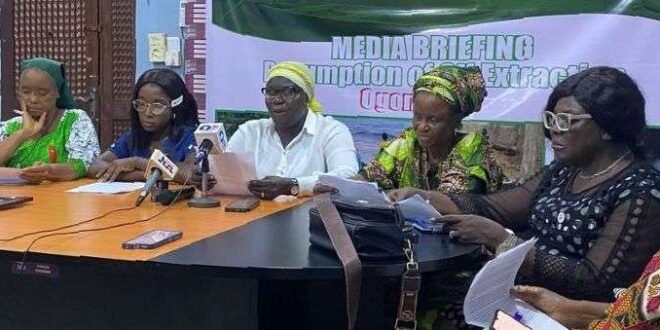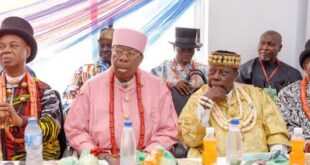… Insist on Mii-dee-kor, Inclusion
By Kelechi Nwaucha
Women from the four local government areas of Rivers State that make up Ogoni ethnic nation have demanded that the Federal Government address issues of rape, repression, military killings and environmental degradation suffered by the Ogonis before attempting “any talk” of possible resumption of oil production activities in the area.
Meeting in Port Harcourt on Tuesday to protest talks of a possible resumption of oil production, the women from the ethnic nation, spanning Khana, Eleme, Tai and Gokana LGAs, lamented the repression, rape, killing and derivation suffered by Ogoni people in their “non-violent” agitation for environmental protection and remediation, and equitable distribution of oil resources.
In a release signed by the over sixteen groups, coming together as ‘Ogoni Women Coalition for Environment,’ with support from Kebetkache Women Development and Resource Centre, the women called for a “stop to any planned attempt to resume oil activities in Ogoniland” until issues of environmental protection, social inclusion and others, as contained in the Ogonis Bill of Rights, are addressed.
The groups include Mba Okase Initiative, Eleme; Eedee Ladies of Tai; De Voice of Eleme Women Association; League of Queens Intl.; Gbogbia Feefeelo Organisation; Lekeh Foundation; We The People; Kebetkache Women Development & Resource Centre; Glocal Concern Women and Youth Development Initiative; Miideekor Environmental Development Initiative; Concern Ogoni Daughter; Peoples Advancement Centre; Ogoni Women Coalition for Sustainable Environment; OWERDI; Yerebaneko Women Group of Tai; Ogoni Women Development Initiative and Society for Women and Youths Affairs (SWAYA).
In a release signed by their representatives, among them, Lezina Pat Nteptep (Eedee Ladies of Tai), Dr. Patience Osaro-Ejiji (Mba Okase Initiative, Eleme), Chief Martha Egbe (De Voice of Eleme Women Association) and others, the Ogoni women said, “It is disconcerting that in the ongoing frenzy to resume oil extraction in Ogoniland, the concerns raised in the Bill of Rights which led to the termination of oil extraction and the repression of the people, have not been addressed.
“Similarly, there has been no attempt to secure justice for the countless families that lost lives, livelihoods and properties in what is still the worst attack on a peaceful indigenous population by Nigerian security forces.”
They pointed out that of note is “the fact that the moves to resume the extraction of oil in Ogoniland is happening against the backdrop of the clean-up of polluted sites in Ogoni.
“It is worrying why the government will decide to resume oil extraction in Ogoniland when the pollution of the last decades is yet to be cleaned and the recommendations of UNEP are yet to be fully complied with. How does one explain the fact that a site supposedly being cleaned up will resume full oil extraction activities with all the pollution that comes with it?
“We, the Ogoni women are deeply concerned about the neglect of key issues around ecological and social justice in Ogoniland. The world recognizes that the people of Ogoni have suffered unprecedented pains and loses on account of oil extraction.
“No apology has been rendered for the destruction of their environment, the killing of their people, the loss of their livelihoods, the destruction of their villages, the forced exile of their people and the murder of their leaders. To assume that the extraction of oil can commence whilst these issues remain on the front burner, is to be naïve at best and cruel at worse.
“It is our recommendation that the government puts a stop to any planned attempt to resume oil activities in Ogoniland. It should rather concentrate on redeeming the ecological disaster in the area, decommissioning aged oil infrastructure, replacing the lost livelihood of the people and securing justice for the countless Ogonis waiting for closure,” they said.
Program Officer at Kebetkache Women Development and Resource Centre, Mrs Idongesit Smart, said the experiences of women in Ogoni, among other issues, motivated her organisation to support the women’s protest for environmental and social justice.
She pointed to the need for environmental remediation, social inclusion and gender equality and efforts to address the unfortunate incidents experienced by Ogoni women in the struggle for environmental justice.
According to Namon Grace Nwindee, Ogoni Women activist and leader of Gbogbia Feefeelo Organisation, the Federal Government and oil companies, should respect the principles of Mii-dee-kor as contained in the Ogoni demands. She said according to the principles of Mii-dee-kor, the wine tapper is free to tap for the week, but one day (Mii-dee-kor) belongs to the owner of the tree.
“We are the owners of the oil well. So they are supposed to give one day of this oil that they are drilling (according to the principles of Mii-dee-kor). But, instead of them to give us that one day, and take other days for themselves, they feel that the money is too much. They refuse to do it.
“We were raped. Soldiers and military men, they raped our children. They raped our mothers. People were killed here and there. And all this simply (not) to give us just one day – to remove all this stress and embarrassment.
“Now, they go around to say they are going to do this (oil resumption). Are we dogs that will vomit and come back to lick the oil? There is nothing that will appease us at all. All the pollution is still on the ground. All the devastation is still on the ground. All the setbacks that they gave to us is still on the ground. Why they have not settled all these things? How can we act to receive them back here,” she asked.
History
In the release made available to our correspondent, the women traced the origin of the crisis in Ogoni to 1958, when “Ogoniland emerged as a focal area within Nigeria’s growing oil economy, contributing major revenues to the country’s economy.”
They said that “Unfortunately, the benefits from oil resources have not reached Ogoni people, particularly the women in any significant measure. Rather, Ogoni women and its communities have for decades borne the impacts of the industry’s adverse activities.
“In 1970, Ogoniland witnessed Nigeria’s first major oil spill arising from an error by Shell, a spill that continued for 3 whole weeks with devastating consequences for the livelihoods of the people. Since then, oil spills and blowouts have occurred on a regular basis in Ogoniland. Estimates have that in the 15-year period between 1976 and 1991, there were 2,976 recorded oil spills in Ogoniland.
“It was this level of neglect and ecological destruction which led to the adoption of the 1990 Ogoni Bill of Rights, a landmark document demanding the right of the Ogoni people to protect their environment and ecology from further degradation. Among others, the Bill describes the Ogoni case as a ‘genocide being committed in the dying years of the twentieth century by multi-national oil companies under the supervision of the Government of the Federal Republic of Nigeria.”
“In 1993, Shell was forced out of Ogoniland where it had extracted crude oil non-stop for decades with unbelievable ecological consequences. The Ogoni people, mobilized under the Movement for the Survival of Ogoni People (MOSOP), called the attention of the world to the poverty, neglect and environmental destruction which decades of oil exploitation had bequeathed on the Ogoni people. MOSOP demanded fairer benefits to the Ogoni people from oil wealth, as well as remediation and compensation for the ecological damage caused by the reckless activities of oil companies.
“The Nigerian military government responded to the demands and non-violent protests of the people with vicious repression. A military operation was initiated in Ogoniland, a move that resulted in mass killings, arson and the eventual execution of environmental rights activists Ken Saro-Wiwa, Saturday Dobee, Nordu Eawo, Daniel Gbooko, Paul Levera, Felix Nuate, Baribor Bera, Barinem Kiobel, in 1995 after the recommendations of a stage-managed trial.
“It is disconcerting that in the ongoing frenzy to resume oil extraction in Ogoniland, the concerns raised in the Bill of Rights which led to the termination of oil extraction and the repression of the people, have not been addressed. Similarly, there has been no attempt to secure justice for the countless families that lost lives, livelihoods and properties in what is still the worst attack on a peaceful indigenous population by Nigerian security forces. Persons who committed acts of genocide and abuses against unarmed populations, and boasted publicly about it, have still not been brought to justice. For the majority of Ogonis, the events of the 1990s remains an open and sour wound, begging for the healing of truth and justice,” they said.
 PH Mundial – Port Harcourt Online Newspaper News Across The Region
PH Mundial – Port Harcourt Online Newspaper News Across The Region





